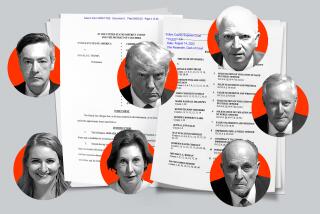Letter Signals Drexel Likely to Be Indicted : If Racketeering Is Among Charges, Freeze on Assets Could Hinder Operations
- Share via
NEW YORK — Drexel Burnham Lambert Inc. received a “target” letter Tuesday from federal prosecutors, confirming that the investment firm itself may soon be indicted on criminal charges in an investigation that has lasted two years.
The letter, from the office of U.S. Atty. Rudolph W. Giuliani in Manhattan, appears to clear up uncertainty over whether the firm, not just certain employees, is likely to be indicted. As reported, similar target letters were sent last month to Michael Milken, the head of Drexel’s “junk bond” department in Beverly Hills, as well as three other Drexel employees and a former trader at the firm.
A source close to the case said Drexel lawyers are due to meet with Justice Department officials in Washington today in an effort to talk them out of approving a racketeering count in an indictment. The Justice Department must give its approval before local U.S. attorneys can issue indictments containing charges under the so-called RICO law, for Racketeer Influenced and Corrupt Organizations Act.
The possibility that the firm itself may be indicted raises more serious questions about whether Drexel would be able to continue operating normally once an indictment is issued. The use of the RICO law in an indictment in a related investigation of another securities firm has raised the possibility that prosecutors could freeze a substantial portion of Drexel’s assets pending a trial.
That case, involving an indictment of partners in the specialty investment firm Princeton/Newport Partners, marked the first time that the RICO law was used in a criminal case against a securities firm. An appeals court held that assets could be frozen because they may be forfeited to the government if the partners are convicted. Alan Bromberg, a professor of securities law at Southern Methodist University, said the legal issue hasn’t been resolved yet. But he said the appeals court ruling might lead prosecutors at least to attempt to freeze a big chunk of Drexel’s assets.
Sources close to Drexel, however, downplayed the likelihood that much of the firm’s assets could be frozen. They said the firm has ample reserves of capital to post a bond that would cover any reasonable amount the government is likely to ask for.
Steven Anreder, a spokesman for Drexel, confirmed that the target letter had been received. He said Drexel Chief Executive Frederick H. Joseph notified the firm’s employees of the development Tuesday by way of a companywide video link.
In a written statement, Drexel said: “The U.S. attorney has advised Drexel Burnham by letter that it is a target of a grand jury investigation looking into alleged violations of criminal law.”
The statement said the U.S. attorney hadn’t yet made an official decision whether to seek an indictment. “Drexel believes any such indictment would be unwarranted and unfair,” the firm said.
In a filing with the Securities and Exchange Commission late Tuesday, Drexel said it had been advised by Giuliani’s office that the firm may be accused of criminal violations “including, but not limited to, securities fraud, mail and wire fraud, and racketeering.”
The SEC filing said Drexel couldn’t give assurances that legal action against the firm “will not have an adverse effect on Drexel Burnham” or its principal owners.
Giuliani’s Office Mum
In an interview, Anreder said that while the firm feels that an indictment wouldn’t be justified, the target letter wasn’t a surprise.
Drexel as well as Milken and several other employees already are defendants in a civil lawsuit filed Sept. 7 by the Securities and Exchange Commission. The suit accuses Drexel and the employees of insider trading, market manipulation and fraud. It has been known publicly for some time that a parallel criminal investigation was under way.
It wasn’t clear Tuesday when an indictment is likely to be returned. It was reportedly expected some time this month, although some sources now say it may be delayed until November. A spokeswoman for Giuliani refused to confirm that the target letter had been sent and also declined to say when an indictment might be issued.
The purpose of target letters is to give prospective defendants a last opportunity to try to persuade the U.S. attorney’s office not to file charges. The letters are considered a good indication that an indictment is imminent. But some sources said Tuesday that there is still a possibility that the firm won’t be named when the indictment is issued.
One defense lawyer in the case said he wasn’t certain when Giuliani would act but added that the target letter and other recent developments indicate that “the tiger is quickening his walk.”
The others who already have received target letters are Michael Milken’s brother Lowell, who also works at Drexel’s Beverly Hills office; Cary Maultasch, a Drexel trader; James Dahl, a Drexel bond salesman, and Bruce Newberg, a former Drexel trader. Dahl recently was granted immunity for testimony before a federal grand jury, and his lawyer said recently that as a result Dahl isn’t likely to be indicted.
A source close to the case said that Dahl provided information to prosecutors that probably played an important role in the decision to send a target letter to the firm. Dahl’s attorney has declined to comment on his client’s grand jury testimony.
A criminal indictment almost certainly would result in a stay of the SEC proceedings against Drexel until the criminal charges are resolved.
More to Read
Inside the business of entertainment
The Wide Shot brings you news, analysis and insights on everything from streaming wars to production — and what it all means for the future.
You may occasionally receive promotional content from the Los Angeles Times.










